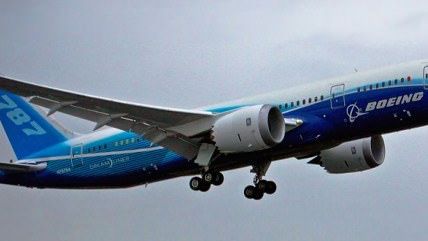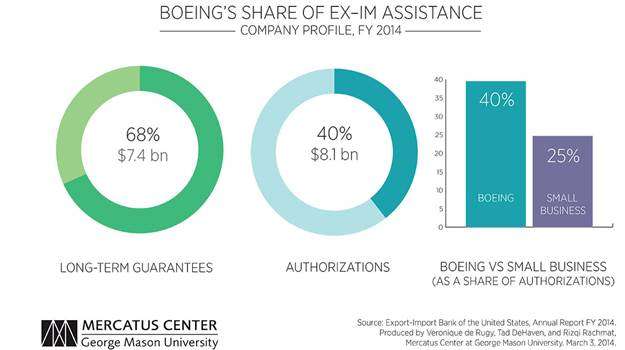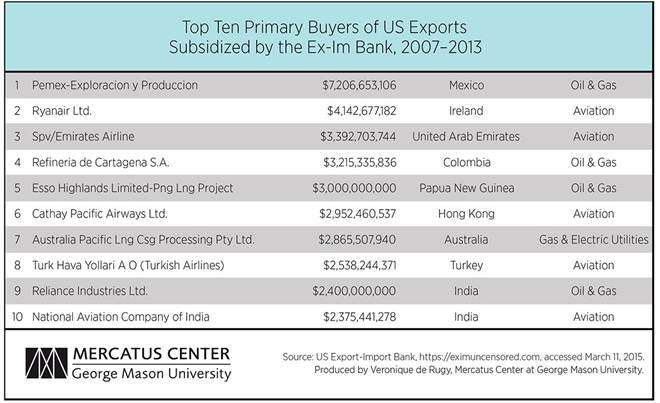You Want to Know Who Benefits from the Ex-Im Bank? Not Small Businesses.
Foreign airlines and oil companies top list of recipients.

The Export-Import Bank has been in the news a lot in the last week. That's because for the first time in its 80-year history, freedom has a chance of winning over rampant cronyism, and Congress may kill the New Deal era agency. Understandably, the bureaucrats at Ex-Im are in panic mode. They have been super active on the lobbying front for months, but in the last few weeks they have doubled down on their "outreach" (translation: special interests' political pressure) to Congress.
Their best chance, they think, is to pretend market itself as an agency that benefits small businesses. It's a smart marketing move, because everyone loves small businesses! Never mind that small businesses in the world of the Ex-Im Bank is defined as a company with up to 1,500 employees and $21.5 million in revenue (so not small, really). Also never mind that the great small business success stories that the bank likes to tell always involve companies that were successfully exporting before the bank got involved (read this great piece by the Heritage Foundation's Diane Katz). Yet, that doesn't stop the bank from claiming credit for the company's exports and brag about how small-business-oriented it is!
More importantly, this image revamp falls apart as soon as you look at who the main beneficiaries are.
On the domestic side: Boeing. Our No. 1 exporter is the beneficiary of 70 percent of Ex-Im loan guarantee program and 40 percent of the Bank's overall activities. The company has a market cap of $90 billion, but apparently it needs help from the federal government. And did I mention that only 25 percent of the money actually benefits these alleged "small" businesses?

But that's old news.
What people may not know, however, is who the main beneficiaries are on the foreign buyers' side. These are the guys who are actually getting the cheap loans to buy U.S. goods.
Here is a table with the top 10 foreign recipients of Ex-Im cheap loans:

Not surprisingly we find many foreign airlines on the list (we could call them "Boeing boosters"). However, as you can see at the top of the list we find Pemex, the Mexican state-owned petroleum company. It has a market capitalization of $416 billion but still managed to secure a cumulative $7 billion in US-taxpayer-backed financing to facilitate deals with Americans since 2007. Worth noting, too, three other oil and gas companies made the top 10.
Now, I find this information strange, considering that the current administration hasn't exactly been pro-fossil fuels. It's been dragging its feet (and is now openly resisting) the Keystone XL pipeline for years. It subsidizes green energy companies through DOE loans (that's the loan program that wasted taxpayers' money on the now-bankrupt Solyndra and Abound Solar, just to name a few), and it always looking for ways to dissuade consumers from buying "dirty" energy with higher taxes and heavy regulations. As Katz noted last year, the Obama administration is "imposing a hefty energy tax on Americans" while "subsidizing fossil-fuel projects in foreign countries."
And then there is this gem from Politico yesterday:
KERRY SLAMS FOSSIL FUELS, MUM ON KEYSTONE: Secretary of State John Kerry passionately called for nations to forgo the short-term lure of "outdated" fossil fuels today in a climate change speech at the Atlantic Council. But he offered no indication of his stance on the Keystone XL pipeline, whose fate is still under his department's review — a review now in its seventh year. "The bottom line is that we can't only factor in the price of immediate energy needs," he said. "We have to factor in the cost of long-term carbon pollution. We have to factor in survival." The implications for humanity's future will be grim if nations don't do so, Kerry warned.
I would laugh if it weren't so sad. My advice is for Kerry is to talk to his boss. It seems that he does know that the Obama administration supports the reauthorization of the Ex-Im Bank, and hence, supports the billions of subsidies going to foreign oil and gas companies. You can't make that up.


Show Comments (95)